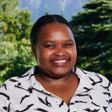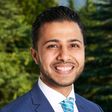
Scholar Stories
Doctor beyond borders: In the mind of an ENT surgeon in training
Taseer Din (Kenya & UCT, 2019) is a medical doctor specialising in Ear, Nose and Throat surgery. Here he tells us why he’s so devoted to his discipline and what he finds beautiful about it.
Can you tell us a little more aboutyour upbringing?
I was born in Nairobi, Kenya; I’m the first born. My parents were doctors, so I was brought up in a very academic environment. I went to St Mary’s school, which was a very diverse school full of extra curricula activities like debating and sports. Amazing personalities emerged from that school. That diversity and meeting people from different backgrounds from a very early age was the most beautiful thing about being in a place like Nairobi. I have a younger sister, 6 years my junior. She is a special needs child who was born with cerebral palsy, so I was always a big brother and subsequently like a father to her.
Would you say that your sister’s condition is a part of why you pursued medicine?
I grew up surrounded by doctors and I always told myself I would never be a doctor. I would go to the shopping centre with my dad and people would come up to him and say “Thank you very much Dr. Din, last week you did this for my child or my husband or wife and they’re better now”. I’ve met many successful bankers and lawyers who had the money and the lifestyle, but I always thought the job satisfaction was missing. As far as my sister is concerned, I have always had a soft spot for children and a very soft spot for special needs children. Growing up with her built a lot of who I am in terms of tolerance and empathy. A lot of my work now in ENT is with children and I will be specialising in paediatric ENT.
Why the focus on ENT?
I think Ear, Nose and Throat surgery has a beautiful mixture of everything. There is medicine which is the practice of dealing with something non-surgical like medication, drugs or lifestyle advice, and there is surgery. I enjoy using my hands and seeing the benefit in somebody weeks later. Lastly, there’s a mixture of age groups: in ENT we deal with newborns and even babies not yet born, to people that are at the end stages of their lives. I enjoy the diversity.
I work at Groote Schuur Hospital and at Red Cross Children’s Hospital. A child will never lie. If they present as sick then they are sick, and when they’re well and happy it shows. Seeing someone crying and miserable turn into a happy and smiling patient is priceless for me. With children, the patient is not only the child but also the family around them. We need to manage the family and work with multiple personnel: the lung doctors, ICU staff, speech therapists, and audiologists. There is a lot of coordination and I enjoy working in a multi-disciplinary team for the benefit of the patient.
How was your experience during your time with the MRF?
Finding out that you have been selected as a scholar was a pleasant surprise; it was very humbling and a privilege. And then you are put into this arena full of wonderful African leaders in their fields. Whether they were teachers or lawyers or worked in international relations they had this warmth and perspective that I don’t think I would have ever gained in other environments.
The second game-changer for me was the effect that African leadership brings to your career. When I look at what happened for me after I put the MRF on my CV, I see that people now view me as an African doctor who thinks about the future of Africa. You can’t put that on your CV in words, but the title of Mandela Rhodes Scholar can carry it. People would research the title and be curious, and then they would approach you. This opened a wealth of opportunities, I’m sure not only for me but other scholars.
How do you keep yourself energized and motivated?
It’s always a thin line between being motivated and drained, especially in our profession. In most African countries we face large shortages of health care personnel. Our department may have 10 registrars in ENT; in the west you may have departments that have 30 or 40 registrars. At Groote Schuur we see up to 70 patients a day between five of us; in the UK, the clinic would see up to twelve patients a day. This does leave one feeling strained.
Having said that, intrinsically much of my motivation comes from my spiritual beliefs. I’m a deeply spiritual person. I believe in a higher being and I believe everything we do is based on a bigger purpose in life. There is a reason why things happen and a reason for us being here. When I pray, I reflect upon that and I believe God will provide the strength we need. Extrinsically I really enjoy people. Serving people that come from poor backgrounds gives me an immense sense of responsibility and satisfaction. I recently got married and we were blessed with a baby a few months ago. Being this busy, going through all this (we are unpaid employees as foreign doctors in South Africa), knowing I am doing this for my wife and daughter are also motivators. These are the kind of values I’d like to instill in my daughter in terms of work ethic, academia and helping people.
What would you say is the most important thing to you?
In one word, family. Family carries you through the ups and downs, family gives you the motivation through the struggles, family does not leave you, family is the imprint behind you. The full cycle of life is me having witnessed the birth of my daughter. It made me understand that life is a miracle and life is a process. My dad once told me that the most important thing in this life is leaving the next generation better off. The bigger purpose in life is propagating values and ensuring that the next generation can embrace them and build on them.
What hopes do you have for your life going forward?
I have been tentatively accepted at Stanford in July 2021 for a fellowship to sub-specialise in pediatric ENT.









